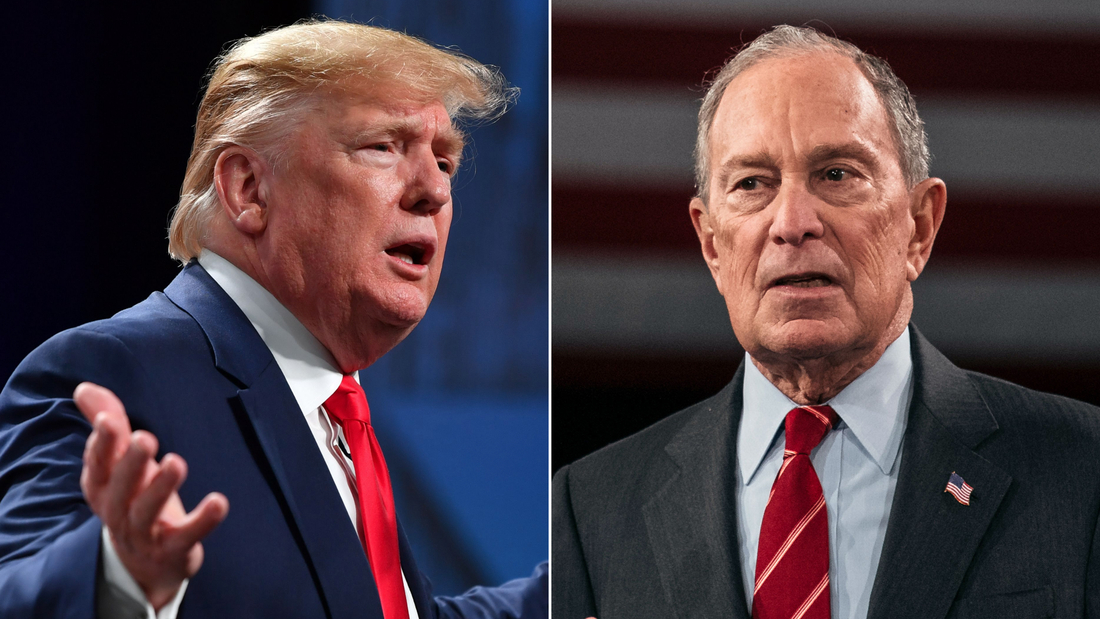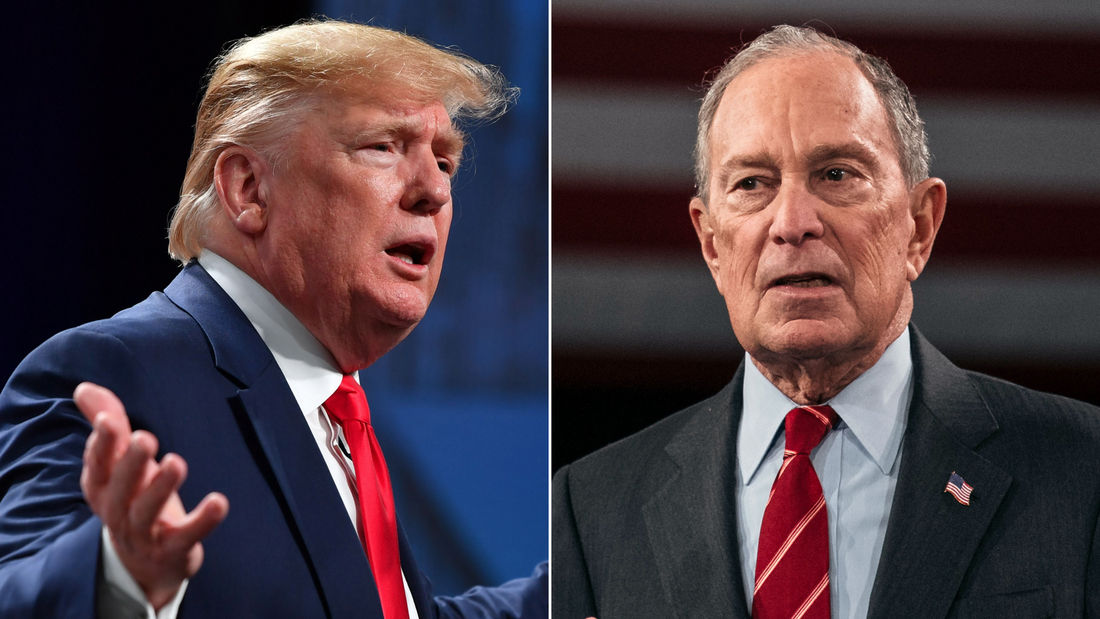
(CNN)Michael Bloomberg is spending unprecedented gobs of his own many billions of dollars on his late entrance into the Democratic presidential primary. What’s he getting for all that coin? How much can he spend under the law? And is this, as some liberals claim, a billionaire buying an American election?
I’ve asked CNN’s Fredreka Schouten, an expert on this stuff, some questions:
Piles of money
ZW: Can you give us a sense of how much Bloomberg is spending compared with everyone else in the Democratic primary? Is there any precedent for something like this in American history?
FS: Bloomberg is blowing everyone else out of the water. American politics has never seen anything quite like this.
As of Friday morning, the former New York city mayor had plowed nearly $386 million into advertising alone, according to a tally by Kantar Media’s Campaign Media Analysis Group. That’s TWICE the advertising spending of the other billionaire in the race, Tom Steyer, who had spent just north of $186 million.
And consider this: Bloomberg entered the race only a little more than two months ago. We ain’t seen nothing yet.
No limits to self-financing
ZW: How much can he spend? Is there anything in US law that addresses self-financing?
FS: As much as he wants. Federal candidates don’t face any restrictions on how much of their own money they can spend to win — or lose — an election.
Back in 2002, Congress attempted to level the playing field between self-funded congressional candidates and their rivals this way: Once a self-funded candidate’s spending crossed a set threshold ($350,000 for House candidates, for instance), contribution limits for all the other rivals in the race would be relaxed.
But the US Supreme Court tossed out that provision as unconstitutional in 2008. And the courthas said rich candidates have a First Amendment right to “unfettered speech.”
No coordination
ZW: Bloomberg has said he will spend millions to defeat Trump even if he loses the primary. What are the limits on how he can spend to help the nominee if it isn’t him?
FS: There are no limits on how much he can spend to help another candidate. The courts have ruled that independent players in politics also have free-speech rights in elections.
He would, however, face restrictions on coordinating his spending decisions with the eventual Democratic nominee.
Think of it this way: Bloomberg could not GIVE Amy Klobuchar’s campaign $1 million if she were the Democratic nominee nor plot with her campaign about how to spend $1 million, because that would exceed the $2,800 general-election contribution limit.
But he could SPEND $1 million on TV commercials, urging people to vote for her.
Creating a narrative
ZW: What will Bloomberg buy with all that money? People don’t just vote for the candidate with the most money. They still have to be convinced. What’s the argument that the money equals an unfair advantage?
FS: Bloomberg’s relentless spending early in the race allows him to create a narrative about himself while his rivals are busy fighting one another for the nomination.
For instance, a Facebook friend recently wrote in my feed that former President Barack Obama had endorsed Bloomberg! That’s not true. Obama hasn’t endorsed anyone in the primary, not even his former vice president, Joe Biden.
But Bloomberg and his team shrewdly created a 30-second ad touting his relationship with the former two-term president.
(It’s not clear how long Bloomberg will remain in control of the narrative, as he has been forced to confront controversies over issues like his policing policies in New York.)
All the other billionaires
ZW: There are plenty of billionaires who want to influence politics. Sheldon Adelson, the Las Vegas casino magnate, will open his pockets to help Trump. What’s the difference between how he can spend on behalf of Trump and how Bloomberg can spend on behalf of himself?
FS: If past is prologue, Adelson will dump millions into outside groups — super PACs and political nonprofits — to help the President. He is subject to rules that prohibit coordinating decisions on spending with Trump and his campaign.
Government financing
ZW: I still get that question on my tax return about whether I want to contribute to federal financing for campaigns. Can Bloomberg or Trump or any Democrat still qualify for that help?
FS: The public-financing system is on life support.
Candidates don’t use it because they must comply with strict spending limits if they take public funds. And in an era of unlimited political spending, no serious presidential candidate would kneecap their own campaign in that fashion.
In the 2016 presidential race, only two candidates received public funds: former Maryland Gov. Martin O’Malley, who sought the Democratic nomination, and Green Party candidate Jill Stein.
Sen. Joni Ernst, an Iowa Republican, has proposed doing away with the fund and using the more than $350 million sitting in the account to reduce the federal budget deficit.
Super PACs
ZW: In recent years we have covered super PACs extensively. Will they still play an important role in 2020?
A number of presidential candidates, such as Sen. Elizabeth Warren of Massachusetts, have denounced super PACs and say they don’t want their help. But these groups likely will play a larger role once the general election is in full swing.
Biden, for instance, disavowed super PACs at the start of the election cycle, only to open the door to one such group as his campaign struggled to gain traction.
But right now, because of the outsized spending by the billionaires in Democratic field, candidate spending is swamping the money spent by outside groups and super PACs.
Corporate cash
ZW: Warren and Bernie Sanders have made a big show of not taking money from certain corporate donors. Does this mean they won’t accept help defeating Trump in November if either of them wins the primary?
We’ll have to see how this plays out. Both candidates have been pretty firm about eschewing corporate money in their campaigns; it’s built into their brands.
But make no mistake: The Democrats’ eventual nominee will not hurt for cash. Democratic donors are fired up. Last year, small-dollar donors gave $1 billion to Democratic candidates and liberal causes through the online platform ActBlue. The floodgates will open for the nominee.
Bottom line cost: Billions
ZW: How much, at the end of the day, is this presidential campaign going to cost?
FS: More than ever before. But it’s hard to pin down an exact number.
The 2016 race cost about $2.4 billion, according to an analysis by the nonpartisan Center for Responsive Politics, which tracks political spending. (That was actually a dip from the previous election, in 2012; Trump’s spending in 2016 was relatively modest.)
There will be nothing modest about the 2020 race. Trump and his allies are raising huge sums for his reelection. And Bloomberg has not ruled out spending $1 billion to defeat Trump, even if the former New York mayor fails to win the Democratic nomination.
Money leaders
ZW: Excluding Bloomberg, does Trump currently have a fundraising advantage over Democrats or vice versa?
FS: Trump is raising a lot of money and is running ahead of most Democrats because he got an early start. He filed for reelection the day he was sworn into office in January 2017.
This week, Trump’s campaign announced that he had raised jointly with the Republican National Committee more than $525 million since the start of 2019. The groups had more than $200 million in available cash, heading into the general election. And they’re just getting started. Trump and the RNC are hosting a fundraiser in Florida near Mar-a-Lago that will cost donors $580,600 per couple.
Except for the billionaires, no one in the Democratic field has that kind of money piling up in their war chests.
Not a system, a patchwork
ZW: If every American could know one thing about campaign finance law, what should it be?
FS: It’s OK to be confused by it because right now the system is a patchwork quilt of laws and court rulings.


Recent Comments